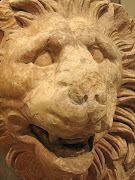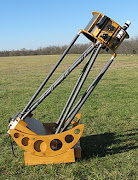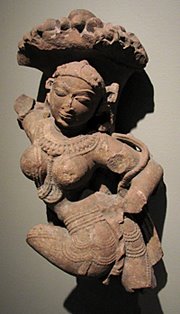The following is a response to an atheist friend who observed that our beliefs are farther apart than he had imagined after reading my analysis of a series of questions presented as a "doubt" quiz on Krista Tippett's "Speaking of Faith" program on American Public Radio. The quiz is drawn from Jenifer Michael Hecht's Doubt: A History. (Link to quiz provided below.)
I have come to realize that insightful dialog doesn't depend that much on agreement from both parties. What is important is a non-dogmatic spirit of inquiry and exploration.
I guess the differences in our position is why we have agreed to disagree on the use of the word God. :-) What I discovered when I found my faith is that my problem was not with God but with what I believe are false conceptions of God.
Sorting that out, understanding it, has helped me be much more confident, even comfortable, considering the beliefs of others. I don't mean in an argumentative way, but in the sense of understanding (and accepting) where my beliefs diverge from those of others.
As a quick example, when I hear statements about God's judgement, it is easy for me to disregard them. God does not judge. People judge, and sometimes ascribe their judgements to God. Profound and needless suffering often results from such behavior. How can one be certain that God does not judge? Simply by observing the natural world, God's creation. We might not like everything we see (because humans do like to judge) but denying what is clearly before us, or attempting to rationalize beliefs that are not consistent with experience, is nothing other than making God in our own image, which is absurd.
It is just as easy for me to dismiss statements that the universe is without purpose. I don't believe we can understand its purpose, but we can discover and understand the natural laws which give it order and govern how it operates. This pattern and order serves some end, no matter how mysterious it must remain to us. I think accepting this central mystery is much the same thing as accepting God. A universe without purpose would be chaos. If you consider any statement insisting that the universe is without purpose, they almost inevitably depend on the notion that humans aren't at the center of it. :-) Just reread the last question in the
Doubt Quiz.
I find it more rewarding, spiritually, to accept that I am part of something far larger than myself, and be happy that I am a part of it. Maybe this is why I have never felt insignificant when doing astronomy. I find it thrilling to be part of something so stupendously grand.
===========================
After reading this post over, I decided to provide my analysis of the Doubt Quiz questions. My overall response to the quiz is that the questions depend heavily on viewpoints informed by traditional monotheistic belief systems. If one's beliefs fall outside those traditions, the questions are poorly formed and the available responses are not meaningful.
1. Do you believe that a particular religious tradition holds accurate knowledge of the ultimate nature of reality and the purpose of human life?
My answer to this is easy: no. Accurate knowledge of ultimate reality is not available to finite beings. Also, it is up to each of us to determine the purpose of our own lives. In doing so, we serve God's purpose, whatever that might be. Some (many?) people turn to religious organizations to find purpose in their lives. This seems perfectly legitimate to me, though I would point out that turning to religion is a personal choice each believer makes.
2. Do you believe that some thinking being consciously made the universe?
I think this questions is incoherent. I responded that I'm not sure, but what I would rather have said is that the question is poorly formed. Thinking and consciousness have meaning in a human context, but what meaning can they have in the context of God? Also, what does the word "made" mean in the context of God? The way humans make things can bear no relation to the actions of God.
3. Is there an identifiable force coursing through the universe, holding it together, or uniting all life-forms?
I said yes to this, but it is another poorly formed question. The issue partly turns on the word "identifiable." In other words material or available to scientific analysis? The universe clearly operates according to "identifiable" laws, and I would say that those ARE dependent on God, which is why I said yes, but the idea of a God force or the equivalent is naive in my opinion.
4. Could prayer be in any way effective, that is, do you believe that such a being or force (as posited above) could ever be responsive to your thoughts or words?
I struggled with this too. From my perspective, the purpose of prayer is not to ask for things one wants but to experience communion with God. In that sense, it is effective. Since I believe God is ultimately beyond human conception, I can't possibly know the relation of my thoughts or words to God.
5. Do you believe this being or force can think or speak?
More anthropomorphism. God does not think in the way humans think. Still, human thought is probably the closest we can come to a symbol of God's thought. Speak? The word seems inappropriate to the feelings I have concerning the presence I have felt.
6. Do you believe this being has a memory or can make plans?
Same issues as for 5.
7. Does this force sometimes take a human form?
I answered no to this because it seems like an obvious reference to the divinity of Christ, which I don't accept. BUT, I could have answered yes because I feel that the form of everything in existence is dependent on God. In this sense, Christ was divine, but then so are you and I, as well as every living and nonliving element in the universe. This sounds like pantheism, but is probably closer to panentheism and I'm not sure I understand either position well enough to be comfortable with them. I don't think of myself as a pantheist.
8. Do you believe that the thinking part or animating force of a human being continues to exist after the body has died?
I answered no pretty easily to this one, though the term "animating force" worried me somewhat because it relates back to my feelings about question 7.
9. Do you believe that any part of a human being survives death, elsewhere or here on earth?
I answered no easily to this, because I would say that what survives is not specifically human, or, perhaps more accurately, we are part of something much larger that is eternal. Again, this sounds close to pantheism/panentheism. Have you read my Samba's Last Day posts?
http://fiskemiles.blogspot.com/2008/07/sambas-last-day.html
http://fiskemiles.blogspot.com/2008/07/final-gift-from-samba.html
10. Do you believe that feelings about things should be admitted as evidence in establishing reality?
I struggled with this but answered yes. My reasoning is that I don't think feelings can be admitted as evidence concerning material existence, in other words, objective knowledge of the natural world, but I think think they support the reality of God. I have a problem with the use of the word evidence, though. I would say this question is poorly formed and probably incoherent. There is also a serious logical fallacy -- begging the question of what reality means.
11. Do you believe that love and inner feelings of morality suggest that there is a world beyond that of biology, social patterns, and accident — i.e., a realm of higher meaning?
Answered not sure. I think morality is a human response, and so is love. I don't think they apply in a coherent way to God. But, I believe in a realm of higher meaning. Or, more cogently stated, I believe humans can comprehend only a tiny fraction of all that is meaningful.
12. Do you believe that the world is not completely knowable by science?
This was an easy one. Yes. Answering no is scientistic.
13. If someone were to say "The universe is nothing but an accidental pile of stuff, jostling around with no rhyme nor reason, and all life on earth is but a tiny, utterly inconsequential speck of nothing, in a corner of space, existing in the blink of an eye never to be judged, noticed, or remembered," would you say, "Now that's going a bit far, that's a bit wrongheaded?"
Another easy yes. Though, what I would actually say is not that it is going a bit far but that it is blatantly wrong. :-)
 I found this image of the Gila River on the WikiMedia Commons website. It was taken by Joe Burgess and has been released into the public domain.
I found this image of the Gila River on the WikiMedia Commons website. It was taken by Joe Burgess and has been released into the public domain.



















